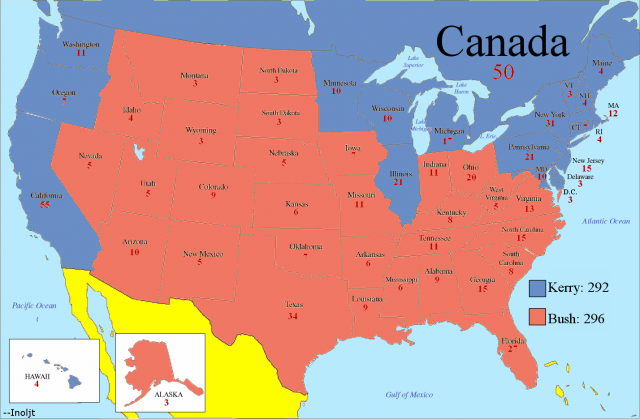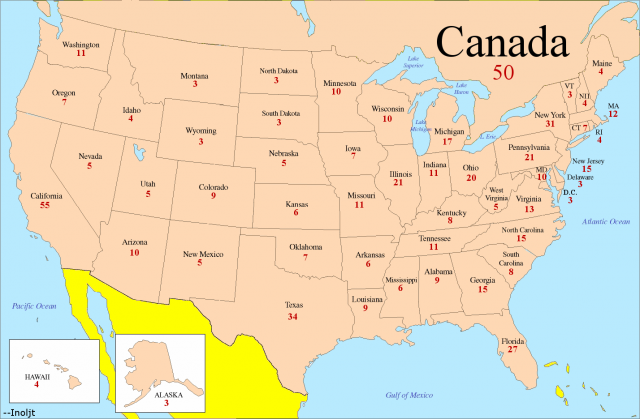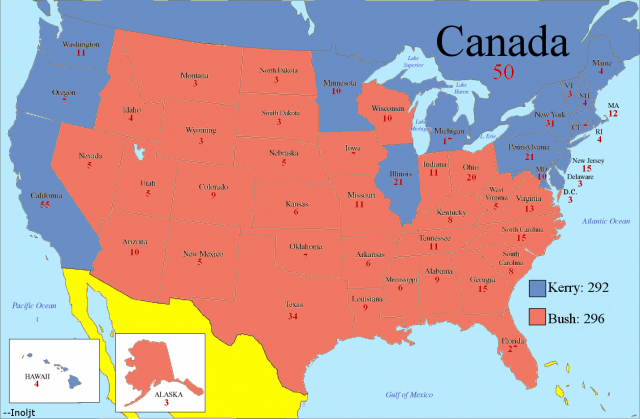This is the first part of two posts exploring the political consequences that would happen if Canada became part of the United States. The second part can be found here.
A note to all Canadian readers: this post was written for the intent of a good laugh, and some serious political analysis along with it. It is not meant to offend, and sincere apologies are offered if any offense at all is taken.
Now…onto the post.
More below.
Part 1: What If Canada Was Part of the United States?
It is November 2nd, 2004. Election night. Incumbent president George W. Bush is nervously watching election returns, joined by his family. Early exit polls showed him losing massively, but the actual results are far more favorable to him.
As the night goes on, Mr. Bush begins to feel more comfortable. He’s ahead in the key swing states. Florida is going for him far more strongly than anybody expected, and things are also looking good in Ohio. It also looks like Mr. Bush has picked up a couple of states from 2000.
Although opponent Senator John Kerry has yet to concede, the celebration at party headquarters has already started. Drinks are opened. People begin cheering.
Then chief strategist Karl Rove comes in, ashen-faced. He turns to the president. “We’re in big trouble. Canada and California are just about to report, and I don’t think that we have the electoral votes to overcome them.”
Mr. Bush is befuddled. “What? Canada’s part of the United States? I always thought it was a different country.”
Mr. Rove looks puzzled. “No,” he says extremely slowly. “It became part of the United States after the War of 1812. Are you all right, sir?”
Mr. Bush laughs. “Of course I’m fine. Just wasn’t thinking for a moment. Of course Canada’s part of the United States. Always has been.”
Unfortunately, Mr. Bush’s presidency is not fine. Deep into the night, as the Arctic territory of Yukon finishes voting, Canada reports. Mr. Bush loses badly, gaining only 35% of the vote. Canada’s 50 electoral votes go to Mr. Kerry. Early next morning Mr. Bush telephones his opponent, conceding defeat. Senator John Kerry has just been elected president of the United States.
Canada in the Electoral College
How likely is this scenario?
Well, of course Canada will not probably not become part of the United States anytime soon. Most Canadians are perfectly happy being separate from America. There is little to suggest that this will ever change.
Nevertheless, it is still quite fun to think about the possibilities.
A state’s electoral vote is based off the number of representatives and senators it has in Congress. For instance, California has 53 representatives and 2 senators, making for 55 electoral votes.
According to Canada’s population clock, the nation has an estimated 34,400,000 people (as of March 2010). This is slightly less than California.
The United States Census estimates its population at approximately 308,745,538 individuals. The House of Representatives has 435 individuals, each of whom represents – on average – approximately 709,760 people. If Canada was part of the United States, this would imply Canada adding 48 (rounding down from 48.47) representatives in the House.
This is a simplified version of things; the process of apportionment is quite actually somewhat more complicated than this. But at most Canada would have a couple more or less representatives than this. It would also have two senators, adding two more electoral votes to its 48 representatives.
Canada would thus add around 50 electoral votes in the electoral college:
These votes would almost certainly be Democratic ones. Most people would agree that Canada is a more liberal place than the United States. This is fairly apparent in the policies Canada pursues; it has universal health care and is less skeptical of climate change than the United States. It would not be too unreasonable to suggest, therefore, that Canada would vote for the more liberal party.
Canada’s Importance
Adding another California to the United States would definitely be a good thing for the Democratic Party. Nevertheless, one should not overemphasize Canada’s importance. After all, it’s population is barely one-tenth that of the United States.
Indeed, Mr. Kerry would have barely squeaked to victory with Canada’s electoral votes. In this hypothetical scenario, Mr. Bush would have just needed nine more electoral votes to win.
Here is one such scenario:
Here Mr. Kerry loses Wisconsin – and suddenly George W. Bush is president again.
This is an entirely possible scenario. Mr. Bush lost Wisconsin by 0.4%. A shift of less than 10,000 votes would have given Mr. Bush the state.
While the addition of Canada would shift America leftward, it is easy to overstate the degree of this. The next post will explore this topic more.
–Inoljt



Sometime I think about this.
Canada as a single state? Every state of Canada as a new state of a bigger union? Greenland?
I will read with interest your point about this.
each province were a separate state, with two senators each? I think that would on balance help Dems in the Senate and electoral college, but not all would be Democratic. Alberta and Saskatchewan, in particular, seem like they’d be GOP-inclined, and who knows what Quebec would do; maybe they’d elect Bloc Quebecois independents who would probably lean the Democrats’ way on most substantive issues. (And would the territories be treated as full fledged states? I think they should, if Alaska is.)
In the House, adding Canada would be a huge Democratic boost. With so much population, Ontario, British Columbia, and probably Quebec would elect Democrats or liberal-leaning members similar to those in urban areas of nearby, mostly blue US states that would probably be more numerous than Reps from more rural, conservative provinces.
First, wouldn’t it be more likely that Canada would be broken up into territories like it is right now?
second, wouldn’t you need to re-apportion the electoral votes so that it added up to 538 in the end?
Let’s assume that all the provinces and territories of Canada are admitted as states. That means each of them get at least one representative and two senators. In order to ensure that the house doesn’t become grossly unrepresentative, I propose a new version of the Wyoming rule, known as the Nunavut rule. Under this proposal, the average house seat would be set to the population of Canada’s smallest territory, Nunavut, pop 33,000. Under this rule, California would have 1,121 representatives. I pity the redistricting commission that has to draw over a thousand districts in California.
First, in Canada, Yukon, and the two other Northern Territories are just Territories in Canada. I doubt they would have standing to join as states. They’d more likely become more like Guam or Puerto Rico.
This assumes the left of center parties in Canada joins the Democratic party (Liberal, NDP, Greens)
This assumes something of a vote distribution similar to http://threehundredeight.blogs… , with exceptions
BC would be as heavily D as Washington/Oregon
Alberta is sort of like TX with Midwestern SoCons. A district or two in Calgary or Edmonton might be competitive.
Saskatchewan and Manitoba are more like the Dakotas, with a island of liberalism in Winnipeg. But there would be a couple of surprising rural districts with Bernie Sanders types of prairie populists.
Ontario would be a significant state, a bit bigger than Illinois. As the combined left of center vote in Ontario approaches 60%, I suspect it would vote more like NY, with a bit of the politics of the MN Iron Range in Sudbery and environs.
Then there’s Quebec. About the population of VA, I suspect they would align differently as part of the US. There would be some islands of R around Quebec City, Ds in the city of Montreal, and separatists remaining elsewhere.
The Atlantic Provinces, no question, would be solid D (with the possible exception of PEI). Newfoundland, IIRC, nearly joined the US back in ’48.
To The US, our entire political system would undergo a radical change. Both are more accustomed to parliamentary democracy, so there are multiple parties with different ideological breakdowns. IMHO it would be very possible for The Green Party to combine with Canada’s Greens & NDP, and with Mexico’s PRD, and start winning for real in British Columbia and Mexico City, and maybe even Quebec should they make a deal with Bloc Quebecois on home rule. Democrats might have to consider forming a coalition government with the Greens/NDP/Bloc/PRD (akin to what Canada’s Liberals have already had to learn, and what PRI & PRD may have to do in the future in Mexico) to gain power in the future.
Republicans, meanwhile, would face a very difficult choice of whether to moderate on social issues to win more Canadian votes and/or drop the anti-immigrant xenophobia to win more Mexican votes.
It would certainly be interesting to see Presidential campaigns get totally upended. Would candidates actually have to campaign in English, French, AND Spanish? In addition to all the usual bowing to Iowa farming interests, Ohio/Michigan industrial concerns, and Florida seniors, would they also have to deal with a whole new set of swing state concerns by addressing the drug cartel violence in Baja California, rebel forces in Oaxaca, and Native Canadian concerns in Manitoba?
I think this post is fascinating BUT one similar to this one in the future should do the Canada calculation province-by-province so a more exact view may be seen.
Also, I hope you do a Mexico post.
I don’t know a whole lot about Canada politics but I think it’s impossible that Canada is THAT liberal. Also, I think that if Canada gets to be part of the Union they may get more conservative. For example, Fox News/James O’Keefe may uncover corruption or wrongdoings in the Canadian healthcare system.
😛
In this thought experiment Canada was absorbed by the U.S. in 1812. There would be no gay marriage or universal health care, well maybe there would, but who knows? So Alberta could very well be lean GOP as history progressed.
Fun to think about though.
As someone is somewhat bitter at all the growth in my Sunbelt state, I have no doubt that their 50 would diminish a little each decade as they move south. If it’s part of the USA, they won’t need any visas or whatever. There’s no way they’d stay put; already the vast majority of Canada lives in the extreme southern tier. I wonder how this would all factor in in years to come.